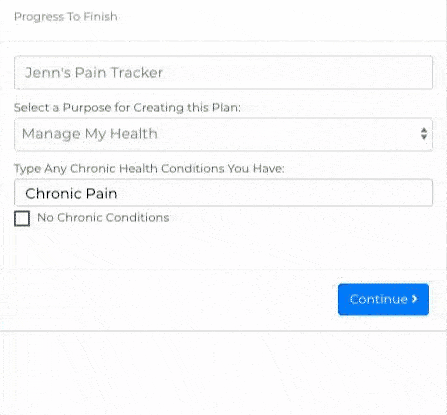
Psoriasis is more than a skin condition. It is a chronic autoimmune disease that affects how you sleep, move, work, and live. It flares up without warning, then disappears into remission, only to return. It targets any part of the skin and is linked to serious health issues like type 2 diabetes, inflammatory bowel disease, heart disease, and psoriatic arthritis.
Roughly 3 percent of the global population lives with psoriasis. There is no known cure. But there is a proven way to manage it more effectively.
The difference comes down to consistency. Managing psoriasis means monitoring every flare-up, every treatment, and every symptom. The problem is that life gets in the way. You miss doses. You forgot when the symptoms started. You cannot recall which foods, products, or routines made it worse. These lapses are not just inconvenient. They directly increase inflammation and reduce the effectiveness of your treatment.
Learn how to better manage your stress with evidence-based strategies and tracking tools.
This is where using a psoriasis symptom tracker becomes essential. With the CareClinic app, you can record symptoms as they happen, track your medications and therapy sessions, and generate a clear timeline of what works and what does not. This means fewer flares, better appointments, and a clear view of your progress.
If you are living with psoriasis and feel like you are always reacting instead of staying ahead, it is time to change that. Start tracking. Start improving.
 CareClinic is one of the top medication reminder and health tracker apps that has been developed for those suffering from chronic diseases. This is perfect for those who need a skin tracking app that stores data needed by their specialist.
CareClinic is one of the top medication reminder and health tracker apps that has been developed for those suffering from chronic diseases. This is perfect for those who need a skin tracking app that stores data needed by their specialist.
The app lists down the name of the medicine and will remind you of the exact time you need to take it, as well as the process on how to take it. These reminders do not look complicated as it is simplified in a to-do-list form. All the patient has to do is input valuable data, and the app will do its job to make their life easier. Setting a passcode on this app is also possible if you ever have privacy issues.
Aside from that, it also has a psoriasis journal to help you manage the symptoms of the disease itself. Setting fitness goals and therapy may also be done to help improve the quality of your life. At the end of each month, all information stored in the app will then be converted into a health record in you can bring to your next doctor’s appointment. This report will also show you if you are doing well with the treatment plan or not.
If you are looking for a Psoriasis Symptom Tracker, CareClinic has all the functionality needed based on feedback from countless patients. It is easy to use and understand, which is perfect for any age. Anybody with psoriasis can use it to improve symptoms and achieve remission right away.
The scaly reality of Psoriasis
Psoriasis is the product of a sped-up skin production process, and typically, the cells grow deep in the skin and then rise slowly to the surface. The skin does not have time to fall off and the rapid overproduction leads to a buildup of more skin cells. Scales develop mainly on elbows, knees, and other joints.
Psoriasis has five types:
- Plaque psoriasis ( the most common type in which 80 percent of people with psoriasis have this type)
- Guttate psoriasis ( common in childhood and the second most common form)
- Pustular psoriasis (common in adults)
- Inverse psoriasis (causes bright areas of red, shiny, inflamed skin)
- Erythrodermic psoriasis (severe and very rare type)
The dreadful symptoms of Psoriasis
Psoriasis is one of those diseases that occurs in episodes, and no one can predict when it will last. There are periods of remission that range from days, weeks and even years. Here are the common symptoms about the type of psoriasis a patient has:
- Plaque psoriasis: dry, raised, red skin lesions covered with silvery-like scales.
- Guttate psoriasis: small sores that appear on the back, arms, legs, and scalp.
- Inverse psoriasis: smooth, shiny patches of red, inflamed skin found usually in the armpits, under the breasts, behind the knees, or groin. These are usually very sore and only appear in the folds of the skin.
- Pustular psoriasis: reddish, swollen patches on the hands, feet, or fingertips that develop quickly with pus-filled bumps. This form of psoriasis can be hazardous, and a physician must be called to check on its prognosis.
- Erythrodermic psoriasis: a red, peeling rash that can cover the entire body. The skin becomes itchy and painful, and looks almost like a bad sunburn.
Aside from the usual symptoms, there is also what you call psoriatic arthritis. This is the inflammation of the skin around the joints of the ankles, knees, and feet. Patients usually feel pain, swelling, warmth, and stiffness. According to medical experts, 20-30% of psoriasis patients develop psoriatic arthritis.
What causes Psoriasis?
The main cause of this autoimmune disease is still unclear at this point. But according to researchers, the disease is related to white blood cells known as T-cells that mistakenly fight off skin cells in the body.
This “wrong attack” causes skin cell production to speed up, causing new skin cells to develop fast. These are then pushed to the surface and, little by little, pile up. The piles that we see are the plaques and are characterized by red, inflamed areas.
Medical experts believe that the T-cells malfunction due to genetics and other environmental factors. Anyone can develop psoriasis, but these factors/ triggers may increase your susceptibility to it:
- Body infections (tonsillitis and middle ear inflammation, tooth and nasal sinus infections, gastrointestinal infections, sexually transmitted diseases)
- Skin irritation caused by severe sunburn, cuts, injuries, bug bites, or tattoos
- Metabolic disorders/anomalies
- Fluctuations of hormones
- Medications (beta-blockers, ACE inhibitors, lithium salts, interferons, chloroquine, certain NSAIDS)
- Allergy-causing substances
- Injury
- Stress
- Excessive consumption of alcohol
- Smoking
- Unhealthy diet
This autoimmune disease is also associated with other health conditions, like cancer, metabolic syndrome, depression and cardiovascular diseases.
In almost all cases, diagnosing psoriasis is pretty direct. Your physician will check your medical history, rule out other conditions, such as eczema, skin fungus, or syphilis. He or she will then examine your skin, scalp, and nails.
The specialist will also take a small sample of skin (biopsy) and have it examined under a microscope. Most specialists may also opt to use MRI scans and radiographs to diagnose psoriasis specifically.
Treatment options for Psoriasis
While there is currently no certified cure for psoriasis, there are a number of effective treatments available. These treatments aim to minimize the inflammation and clear the skin, and can be divided into three main categories:
- Topical treatments: creams and ointments are good for treating mild to moderate psoriasis. In more severe cases, creams are combined with oral medication or light therapy. Topical psoriasis treatments include corticosteroids, vitamin D analogues, anthralin, topical retinoids, calcineurin inhibitors, salicylic acid, coal tar, and moisturizers.
- Light therapy (phototherapy): This treatment makes use of either natural or artificial UV light, and can include using sunlight, UVB phototherapy, narrow band UVB phototherapy, Goeckerman therapy, psoralen plus ultraviolet A, and excimer laser.
- Oral or injected systemic medications: These are mainly used in severe cases of psoriasis, which include retinoids, methotrexate, cyclosporine, and drugs that alter or suppress the immune system.
Medications, Meals, and Tracking: The Real Formula for Managing Psoriasis
Your physician will choose a treatment plan/therapy best suited to your needs and type of psoriasis. You will be given mild medications at first before gradually proceeding to stronger ones. Some doctors may also try to combine different types of treatment to reduce the symptoms quickly. But this depends on the patient’s case. Some may be using the same treatment their entire lives, while some have changes in their treatment plans along the way.
Aside from taking medications, having a balanced diet helps in alleviating symptoms of this disease. Losing weight is a good start as it reduces the severity of the condition. Others also choose to eat foods rich in omega-3 fatty acids and protein.
Drinking less alcohol lowers flare-ups, so make sure to abstain from drinking. Avoiding trigger foods such as red meat, refined sugar, dairy, and processed products. Tracking multivitamins intake and taking them helps strengthen the immune system, lowering the risk of having severe psoriasis. All of this information can then be inputted into the app to have a constant reminder of eating a healthy meal every day.
Psoriasis Symptom Tracker
Having psoriasis is tough and challenging for most people. It’s something that stays physically for a long time and may even affect the socio-emotional aspect of your life. But CareClinic has amazing features that facilitate any treatment plan available.
It has a psoriasis journal in which you can input your symptoms, medications, triggers, and mood daily. It also has an option to compile it into a monthly report for your doctor.
This allows your specialist to come up with a relevant treatment plan or therapy for your condition. The medication reminder may also be used to set up notifications for your specialist’s appointments, light therapy, and other activities.
CareClinic indeed has a lot of features to help curb the challenging life of having psoriasis. In the palm of your hand, this app will surely make a big difference and make each day as bearable as possible.


